Related Research Articles
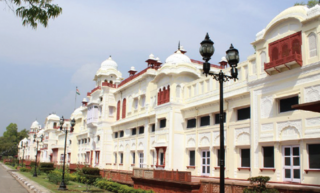
Patiala is a city in southeastern Punjab, northwestern India. It is the fourth largest city in the state and is the administrative capital of Patiala district. Patiala is located around the Qila Mubarak constructed by the Sidhu Jat Sikh chieftain Ala Singh, who founded the royal dynasty of Patiala State in 1763, and after whom the city is named.

The Partition of India in 1947 was the change of political borders and the division of other assets that accompanied the dissolution of the British Raj in the Indian subcontinent and the creation of two independent dominions in South Asia: India and Pakistan. The Dominion of India is today the Republic of India, and the Dominion of Pakistan—which at the time comprised two regions lying on either side of India—is now the Islamic Republic of Pakistan and the People's Republic of Bangladesh. The partition was outlined in the Indian Independence Act 1947. The change of political borders notably included the division of two provinces of British India, Bengal and Punjab. The majority Muslim districts in these provinces were awarded to Pakistan and the majority non-Muslim to India. The other assets that were divided included the British Indian Army, the Royal Indian Navy, the Royal Indian Air Force, the Indian Civil Service, the railways, and the central treasury. Provisions for self-governing independent Pakistan and India legally came into existence at midnight on 14 and 15 August 1947 respectively.

Purana Qila is one of the oldest forts in Delhi, India. It was built by the second Mughal Emperor Humayun and Surid Sultan Sher Shah Suri. The fort forms the inner citadel of the city of Dinpanah. It is located near the expansive Pragati Maidan exhibition ground and is separated from the Dhyanchand Stadium by the Mathura Road, Delhi.

Sheikhupura also known as Qila Sheikhupura, is a city and district in the Pakistani province of Punjab. Founded by the Mughal Emperor Jahangir in 1607, Sheikhupura is the 16th largest city of Pakistan by population and is the headquarters of Sheikhupura District. The city is an industrial centre and satellite town, and is located about 38 km northwest of Lahore. It also borders Sialkot, Gujranwala, Nankana Sahib and Kasur districts of Punjab, Pakistan.
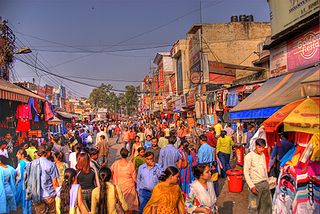
Lajpat Nagar is a residential and commercial neighborhood in the South East Delhi district of Delhi. It was named in honor of Lala Lajpat Rai and is today most known for the Lajpat Nagar Central Market. This area is not to be confused with the Lajpat Nagar in Ghaziabad in the NCR region.

Ramesh Sippy is an Indian film director, actor and producer in Hindi cinema. He is particularly known for being director in Sholay (1975), which is regarded as one of the most influential film in Northern India ever made. The Government of India honoured him with Padma Shri in 2013.

British Punjab was a province of British India. Most of the Punjab region was annexed by the British East India Company on 29 March 1849, and declared a province of British rule; it was one of the last areas of the Indian subcontinent to fall under British control. In 1858, the Punjab, along with the rest of British Raj, came under the direct rule of the British Crown. It had a land area of 358,355 square kilometers.

Sikhism in Pakistan has an extensive heritage and history, although Sikhs form a small community in Pakistan today. Most Sikhs live in the province of Punjab, a part of the larger Punjab region where the religion originated in the Middle Ages, with some also residing in Peshawar in the Khyber-Pakhtunkhwa province. Nankana Sahib, the birthplace of Guru Nanak, the founder of Sikhism, is located in Pakistan's Punjab province. Moreover, the place where Guru Nanak died, the Gurudwara Kartarpur Sahib is also located in the same province.

Majha is a region located in the central parts of the historical Punjab region split between India and Pakistan. It extends north from the right banks of the river Beas, and reaches as far north as the river Jhelum. People of the Majha region are given the demonym "Mājhī" or "Majhail". Most inhabitants of the region speak the Majhi dialect, which is the basis of the standard register of the Punjabi language. The most populous city in the area is Lahore on the Pakistani side, and Amritsar on the Indian side of the border.

Hafizabad District is located in Punjab, Pakistan. Hafizabad was made a district in 1993; formerly, it was a tehsil of Gujranwala District. It is situated in central Punjab and is known for its rice industry on the agricultural side and rice industry on the industrial side and have top 5 exporters of rice from Pakistan.

The Maharaja of Patiala was the title of a Maharaja in India and the ruler of the princely state of Patiala, a state in British India. The first Maharaja of Patiala was Baba Ala Singh (1695–1765).
Religion in the Punjab in ancient history was characterized by Hinduism and later conversions to Jainism, Buddhism, Islam, Sikhism and Christianity; it also includes folk practices common to all Punjabis regardless of the religion they adhere to. Such practices incorporate local mysticism, including ancestral worship and worship of local saints of all faiths.

Patiala State was a self-governing princely state of the Empire of India, and one of the Phulkian States, that acceded to the Union of India upon Indian dominionship and partition. Patiala Kingdom/State was founded by Sidhu Jat Sikhs.
Indians in Pakistan typically refers to Indian nationals working, studying or generally residing in Pakistan as expatriates. It also includes Indian emigrants to Pakistan, Indian spouses married to Pakistanis and Muhajirs
Manawala is a city in Sheikhupura District, Punjab, Pakistan. It is situated on the Lahore-Sheikhupura-Faisalabad road.
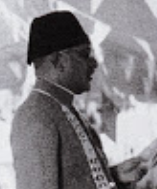
Nawab Iftikhar Hussain Khan of Mamdot was a Pakistani politician and an advocate of the Pakistan Movement in British India. After Pakistan's Independence, he served as the 1st Chief Minister of West Punjab and later as the Governor of Sindh.
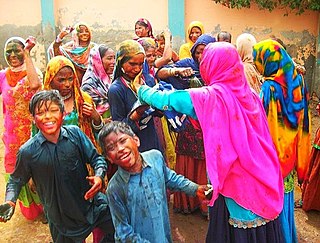
Hinduism is a minority religion in Punjab province of Pakistan followed by about 0.2% of its population. Punjab has the second largest number of Hindus in Pakistan after Sindh. Hinduism is followed mainly in the Southern Punjab districts of Rahim Yar Khan and Bahawalpur.

Shobha Nehru, commonly known as Fori Nehru and Auntie Fori, was a Hungarian-born Indian social worker and the wife of the Indian civil servant Braj Kumar Nehru of the Nehru family.
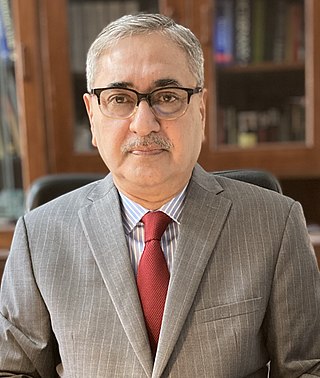
Raghuvendra Tanwar is an Indian professor and writer. In 2022, he has been awarded Padma Shri by the Indian Government for his contribution in literature and education.
References
- ↑ Venugopal, Vasudha (26 July 2016). "Director of hit TV drama Buniyaad, Ramesh Sippy, still not paid by Doordarshan". The Economic Times. Retrieved 11 April 2020.
- ↑ "'Buniyaad' set to re-create the nostalgia of partition and popularity of old-world charm". Indian Television Dot Com. 25 July 2013.
- ↑ "SaharaOne aims to tap Gen X with 'Buniyaad'". Indian Television Dot Com. 20 January 2006.